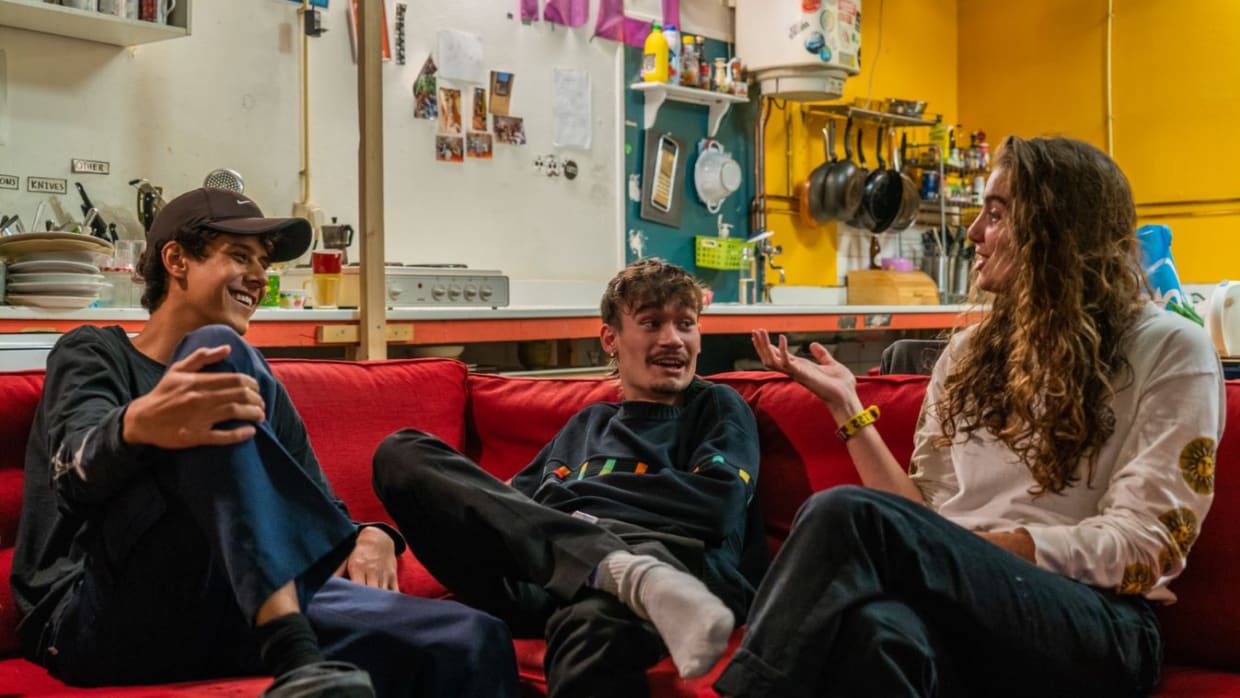
In this student house, college, high school and university students live together
MBO students have now officially been students for two years and soon they may be able to participate in Intreeweek. But how well can students from mbo, hbo and wo live together? We visited the old Acta building on Louwesweg, where they live together.
It is the eve of a party in the old building of the Academisch Centrum Tandheelkunde Amsterdam, better known as Acta. It is a student flat where 460 students from all educational institutions and directions live together. It is a special place because students from mbo, hbo and wo programs live together here. This was the case before high school students were legally allowed to call themselves students as well two years ago.
Currently, MBO students are not always welcome in all parts of student life. For example, they cannot join many student (sports) associations, do not get student discounts everywhere and are not allowed to apply for student rooms. This goes against the grain of Minister of Education, Culture & Science Robbert Dijkgraaf. He calls on everyone to place more value on all levels of education and fields of study. "We have to get rid of the vertical model full of ladders and stairs where one is higher or better than another," Dijkgraaf says.
On corridor 3.2 of Acta, people are busy preparing for a birthday party: someone is cooking for 10 of the 17 roommates, the karaoke machine is plugged in and the corridor is still being quickly swept. Folia speaks to three students who have been living together for some time; all three are studying at different institutions. Jefta, Cameron and Sophia tell how they experience living together as mbo, hbo and wo students, what they learn from each other at home and what their view of the Dutch education system is.

Jefta Wattimena (25; mbo 4 commercial technical engineer/consultant sustainability, ROC Amsterdam)
"Living together with people from different educational institutions is really interesting and also relaxed. Many people from my education are also very young and have little understanding of things in life that I am already involved in. They also almost all still live with their parents. In dealing with them, you don't really notice here whether someone does mbo, hbo or uni. You only notice it when you start looking at study-related behavior, especially around exam weeks. I notice that people at uni are more disciplined and better prepared because they know how hard it is going to be. They do seem more stressed. I think because of how much planning and discipline is required of you when you have to do a lot of studying on your own."
"I think making the education system less vertical is a good plan. My program is already working on that by educating us a little more theoretically so it's more in line with similar college courses. A lot of time is needed for that transition, though, because the bridges between college and university are still very large. It is important that the government starts seeing MBO students as students if it wants to implement this plan. In that respect, they could learn something in The Hague from how we deal with each other here. They have to show that they also belong in a place where university students live. It didn't bother me so much myself, but it might bother someone a lot younger."
"You are mainly treated as a pupil at the mbo. It's like high school. Especially if you're a bit older, that's very annoying. Even for the somewhat younger people, I think that more freedom gives them more independence and they would also deal more easily with students from other 'levels.' Then the image of MBO students has to change - there are now student cafes where you simply don't get in as a MBO student."

Cameron Forkes (22; Drug Design and Synthesis, UvA/VU)
"I find it quite refreshing to live with people from other institutions and studies. I come from the United Kingdom (UK) and class thinking plays a big role there. That is less predominant here. You are then always stuck with the same people in the UK; if you weren't in the right class, you couldn't be yourself. That also makes it very monotonous and it's not a reflection of society. I always enjoy hearing what other people are doing, which is why it's so interesting that people in our house are doing so many different courses."
"On a personal level, I don't notice many differences between the people who live here. You do notice that people who do or have done a more practical education approach problems at home differently. You then lean on those people more if something needs to be repaired or fixed, while you go to other people if you want to do something artistic."
"I think you can learn much more from each other if you make connections with people from different groups, such as someone you would normally have less contact with, for example, because of the way the system is set up. You can become quite close-minded from just interacting with people from your own bubble."
"I hope the education system here does change and become less vertical. Personally, I envision the ideal system as a kind of tree, where your options grow out like branches. Not all branches touch in the tree, because sometimes you need certain expertise to achieve something. You have to be able to grow in the branch you are in and sometimes jump to another one. We do then need to value all fields of study more and let people focus on what makes them happy, not just with getting higher."
That we all live here together also shows that the boundaries between groups may not be where others think they are. I think the people who want to change the system can learn something from that.”

Sophia Delenardo (24; Communication, Multimedia and Design, HvA)
"In general, I don't notice that many differences between roommates at wo, mbo or hbo. You do notice that the structure of courses is very different. I myself never have exams. Usually I have to write something, do research or make a design. When I hear other people talk about learning and doing a master's, it inspires me. Then I want to start cramming and learning again myself."
"What I didn't expect was how much we actually study together here at home. For example, at the kitchen table or at a cafe nearby. In my previous home I rarely did any studying at home, but here there is always someone who feels like studying together. You literally learn a lot from each other because there is always someone who can and wants to help. If I have to write something, for example, I always have several people willing to proofread it."
"It's just nice to hear what other people are doing. As a result, you also get inspired by their stories and motivated to take action yourself. For example, I am now hard at work looking for an internship. Everyone is busy with school again and that motivates me to get back to work myself."
"I find that sometimes - not here in the home - people look down on practical professions or training, even though they have a lot of value. I also know people who do uni or try uni purely to say they have done it, not because they have a real goal. Or people who do hbo after vwo and then everyone asks, 'Why didn't you go to uni?'"
"So I think that the different institutions should be expressed less in value, but more in how you can apply them in real life. That you don't go wo because you have to get the highest education, but because you want to do something in science. It's a waste if social pressure makes you do something that doesn't suit you as well.'
"We should just value each study and student in their own way and not compare or make everything compete with each other. It's kind of like comparing apples to oranges then."

